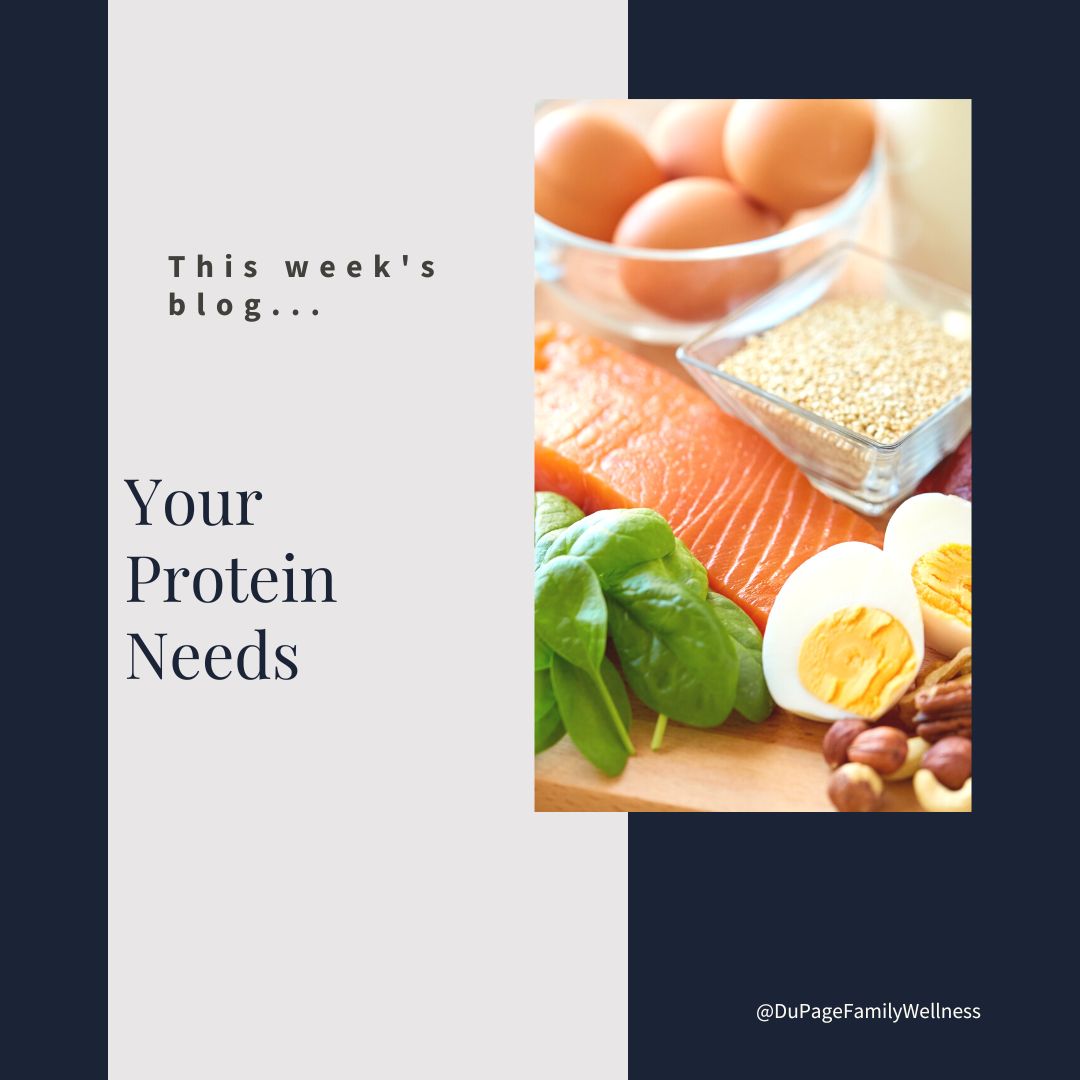 Your body may need quite a bit more protein than you are giving it. I’m not talking about adopting a keto or carnivore diet, but you need protein along with complex carbohydrates and healthy fats to thrive.
Your body may need quite a bit more protein than you are giving it. I’m not talking about adopting a keto or carnivore diet, but you need protein along with complex carbohydrates and healthy fats to thrive.
Every cell in your body contains protein, and it fulfills many different roles in the body. Since the body does not store protein, it depends on your diet to provide adequate amounts. Many women I know are not getting nearly enough protein even if they think they are.
So, how much protein do you need? Well, it depends. Let’s look at what your body needs and explore the healthiest ways to get this protein.
Why is Protein Important
Protein contains amino acids that are used to repair all the tissues in your body. You may think about your muscles needing protein (which they do), but in reality all of your systems (digestive, respiratory, circulatory, endocrine, etc.) need protein.
In a very real way, protein is one of the building blocks to a healthy and strong body. According to livestrong.com, protein actually helps “build muscles, produce new cells, regulate hormones and enzymes, heal wounds, and promote immune function”.
It is considered the most important macronutrient in building muscle, which can elevate your metabolic rate. And since protein also helps you feel full longer, it is great for those wanting to lose weight.
How Much Protein I Need: The Simple Way
Your protein needs are individual; there is no one-size-fits all measurement. Typically, you need .8g-1g per lb. of body weight, but this will of course depend on your activity level and your body mass index (BMI).
Here is an example of using this method to figure out the protein needs of someone weighing 160lbs.
.8g x 160lbs. = 128g of protein to 1g x 160 lbs. = 160g of protein
So, an 160 lb. person would need approximately 128-160 grams. That is a lot of protein!
What does this mean in terms of food?
When most of us see 130g of protein, unless you have been tracking your food, that doesn't mean a whole lot to you. So how would you go about getting 130g of protein in a day?
One of my favorite strategies is to break it up into pieces. That way, 130 grams would be 3 meals with 30 grams each plus 2 snacks with 20grams each.
What do 30 grams of protein actually look like?
Read more ...
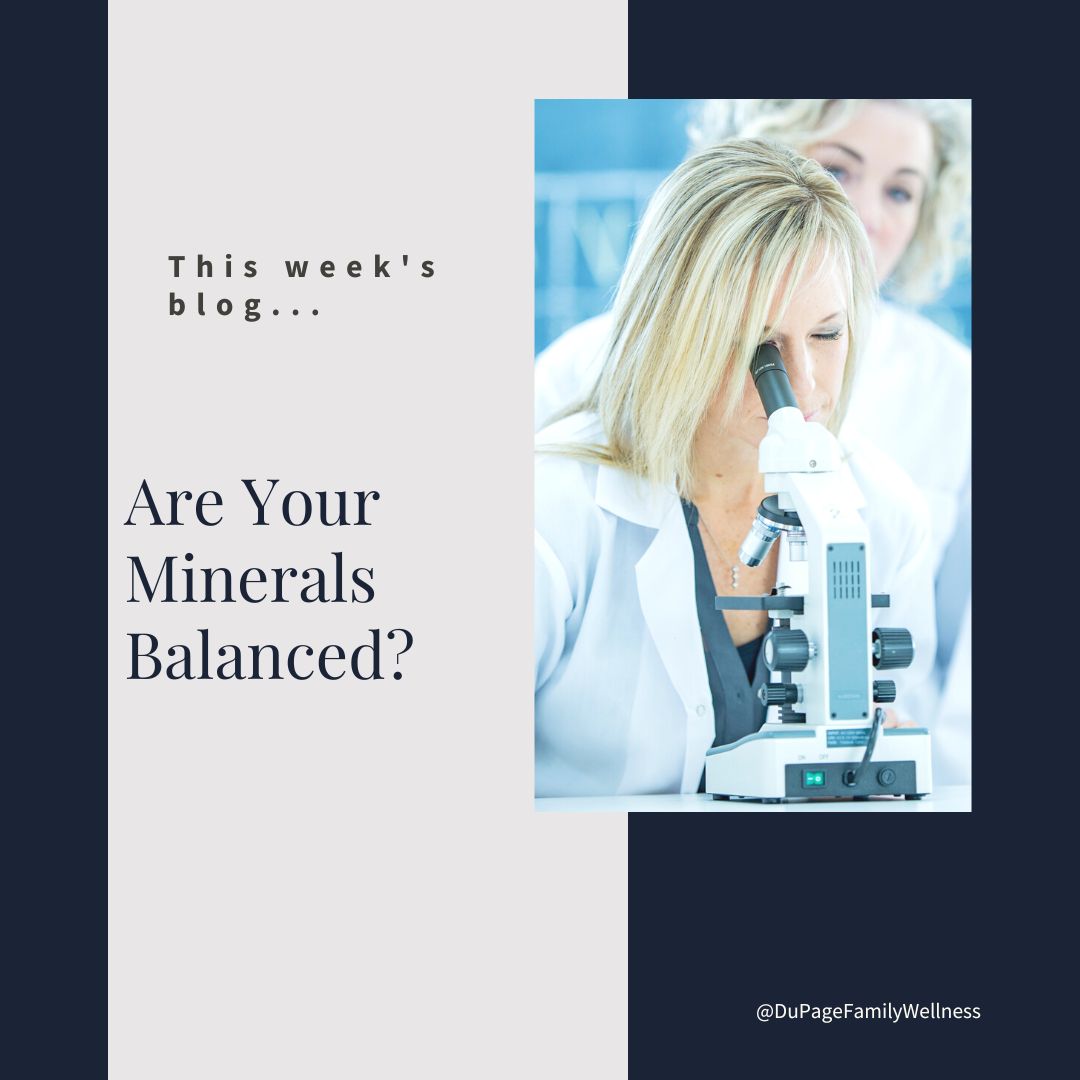 Over the last few months, I have been doing a deep dive into all things minerals. It is fascinating when you understand what minerals do in the body. It is even more interesting to see how minerals work together in a unique way.
Over the last few months, I have been doing a deep dive into all things minerals. It is fascinating when you understand what minerals do in the body. It is even more interesting to see how minerals work together in a unique way.
For example, magnesium is a key component for hundreds if not thousands of reactions, while copper and oxygen are used to make ATP which is our main energy source.
All of the cells in your body require minerals to make energy and hormones, but most of us are low in some minerals. Getting the right balance of minerals can make a huge difference in how you feel.
Let's explore why we may be low in minerals and learn how to check to see what minerals you may need to replenish.
How Could I be Low in Minerals?
Several things are leading to the depletion of key minerals in our world.
- Our soil is more depleted than it used to be. This results in the plants and animals that we eat having fewer minerals.
- Pesticides used on crops commonly deplete minerals.
- Medications deplete minerals (blood pressure medicine, birth control, corticosteroids, PPIs, etc.). Check out this article for more details.
- Surprisingly supplements can deplete minerals. For example, too much vitamin D can actually deplete magnesium and sometimes copper.
- Water filters can remove minerals from water.
- Stress depletes minerals! When we are stress, we burn through our minerals at a much faster rate.
While you can learn about your mineral status from blood tests, they don't give you the full picture. Since our bodies are great at keeping homeostasis (balance) in the blood they will often steal minerals from other places in the body to bring about this balance. In addition, when there is an excess of minerals the body may store them in the tissue to keep the blood at the level it needs to be. For this reason, I have been intrigued by Hair Trace Mineral Analysis lately.
Hair Trace Mineral Analysis (HTMA)
Since hair is one of many places the body eliminates minerals and heavy metals, it gives us an accurate picture of the minerals that may be lacking in the body. It also shows you when heavy metals or minerals are at excessive levels.
Some of the minerals it tests for are calcium, magnesium, sodium, and potassium. These minerals are not produced in the body and must be gotten through your diet. It is important that these four minerals are balanced in your body; without them, you will not be able to feel your best.
Read more ...
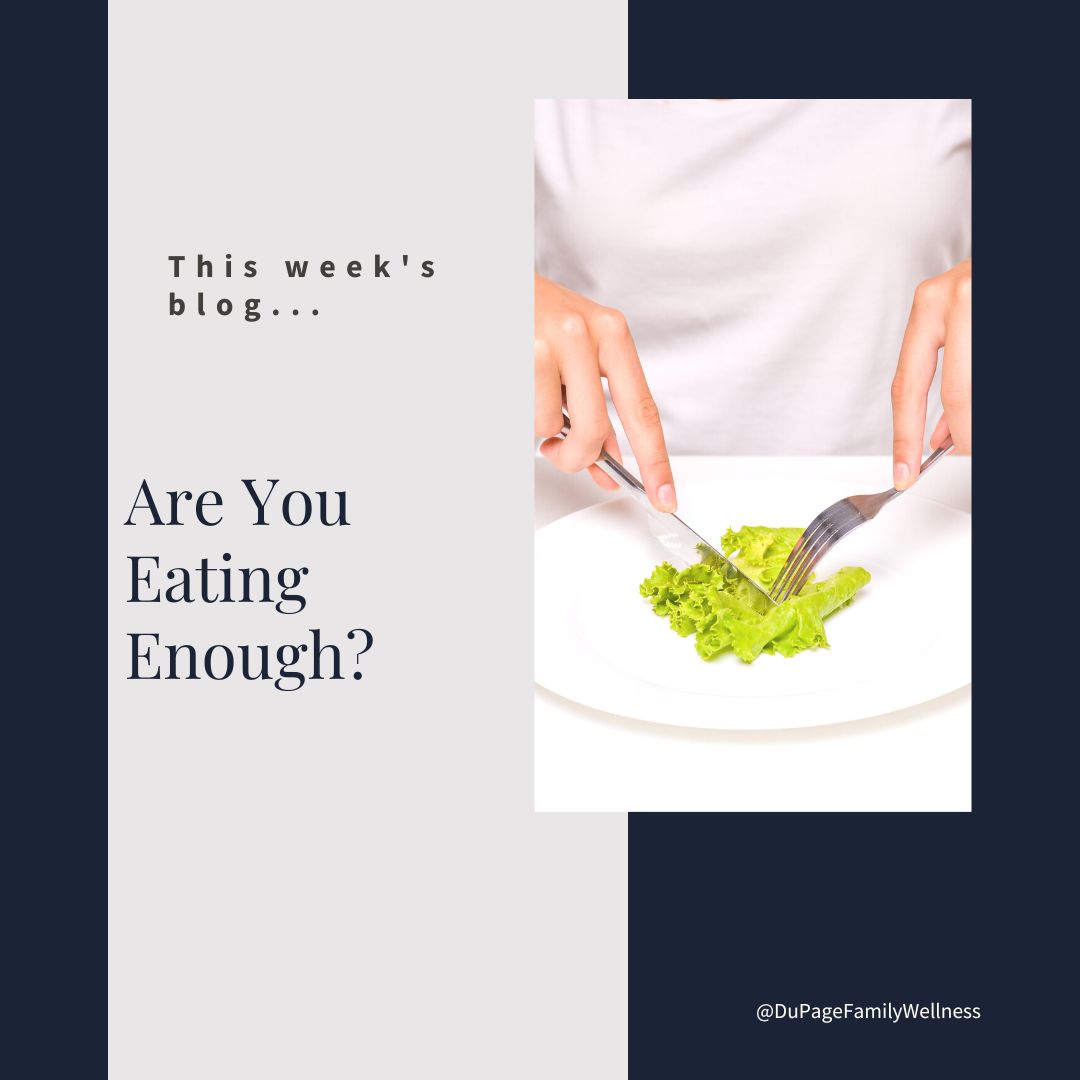 When you think of eating healthy do you ever think about eating more calories? Most people think that they need to limit calories to eat healthy, but this simply is not the case and can actually cause a lot of harm.
When you think of eating healthy do you ever think about eating more calories? Most people think that they need to limit calories to eat healthy, but this simply is not the case and can actually cause a lot of harm.
Your body needs enough calories to function. Every system of your body is dependent on the nutrients it gets through your food. When you don’t get the calories you need, your body will not function well, and you will start to have symptoms.
Unfortunately, our culture has glamorized low-calorie diets to the point that many people don’t even know what is normal anymore. In fact, many women are chronically undernourished without even being aware of it.
Are you one of these women? Let’s find out!
Not Eating Enough
Without enough calories your body will start to turn on itself to supply the need for nutrients and energy. Your body will tell you that you need more calories in all kinds of subtle ways. If you don't listen to the subtle symptoms, your body will begin to speak louder. Symptoms may include:
- loss of muscle
- slower metabolism
- lower quality of sleep
- decrease in energy
- irregular cycles
- increase in anxiety and depression
- hair loss
- gut issues (including stomach aches and bloating)
- symptoms of hypothyroidism (cold hands/feet, etc.)
- symptoms of adrenal fatigue (lightheaded, fatigue, body aches, etc.)
- weight gain (your body confuses lack of calories as a famine and holds on to everything possible.)
Since eating enough is so important and many women undereat without knowing it, I encourage you to follow the following steps to make sure your body is getting what it needs.
Calculate Your Total Daily Energy Expenditure (TDEE)
If you have followed me for a while, you know that I'm not a big fan of counting calories… BUT it can actually be an incredibly helpful exercise to do for a few days to make sure you are eating enough!
That's right- I find that SO MANY WOMEN are either intentionally restricting calories or don't even realize that they are eating WAY LESS than their body needs.
Read more ...
 Most people think of grilling out in the summer, but the fall is a perfect time to heat up the grill. As the weather gets cooler it is more pleasant to cook outside and sit on the patio for a nice meal.
Most people think of grilling out in the summer, but the fall is a perfect time to heat up the grill. As the weather gets cooler it is more pleasant to cook outside and sit on the patio for a nice meal.
It doesn’t have to be time-consuming to have a great meal on the grill, in fact, simple is often better. Meat and veggies by themselves make a solid meal, but you can add grilled fruit for a yummy dessert.
Eating these simple, real foods - specifically the meats and the veggies - is a healthy easy option for a dinner everyone will love.
Here are my top grilling tips for you to enjoy this fall.
The Meat
Start planning your meal by choosing your meat. With most food, there is a large spectrum of quality. You may not be able to get the highest quality variety, so just do your best with the options available! Let’s see what to look for when buying your meat.
- Good - Meat that is not breaded with flour or breadcrumbs or loaded with sugary or processed sauces. (Note: The first ingredient in many BBQ sauces is high fructose corn syrup).
- Better - Meat from a healthy animal that had a chance to walk around and eat its natural diet while it was alive. If you are purchasing meat, look for words like pasture-raised, grass-fed (for beef), or wild caught (for fish).
- Best - Meat from a local farmer’s market where you can meet the farmer! When you talk with the farmer ask them how their animals are raised. If you like their answer, get the meat from them when you can!
Grill the meat and keep it simple! If you have good quality meat, the flavor will be great. You don't need to add much to it.
The Veggies
It's easy to get stuck in a rut of always buying the same veggies but trying some new ideas can really spice things up. When you eat a variety of veggies you tend to eat more of them. You can choose a few of the ones below to throw on the grill.
- Eggplant - Simply cut it into ½-inch patties.
- Asparagus - Bend the stock to snap off the thick base, leaving the pretty flowery end.
- Zucchini - Slice into ¼-⅓ inch slices.
- Onions - Just cut it in half and grill that way. You can also cut it smaller for kebabs!
Read more ...
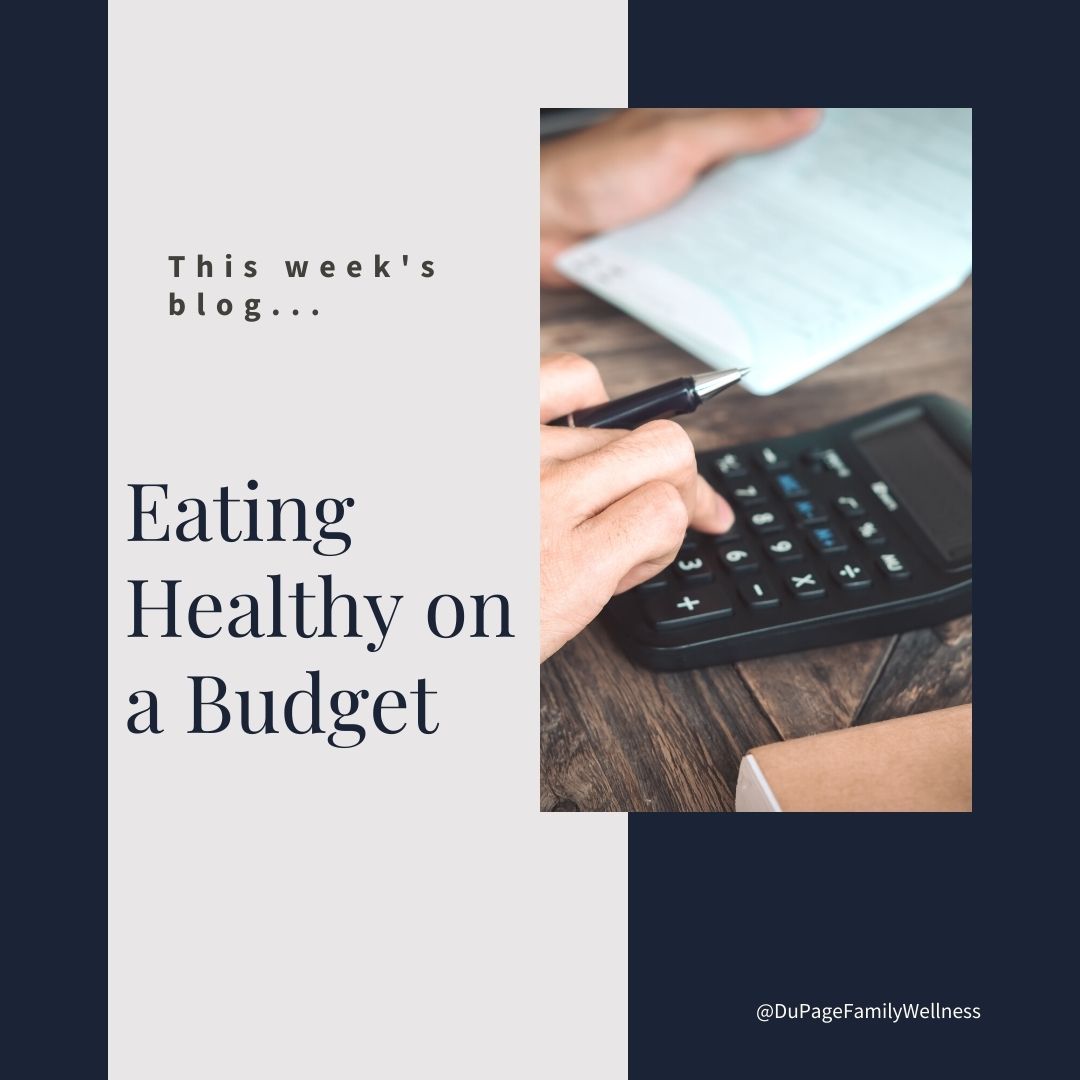 You may want to change your diet, but don’t feel like you can afford it. The cost of everything has gone up; isn’t healthy food even more expensive? Well, not necessarily.
You may want to change your diet, but don’t feel like you can afford it. The cost of everything has gone up; isn’t healthy food even more expensive? Well, not necessarily.
If you have the motivation to start a healthier lifestyle by eating nutrient-dense foods, you may be surprised to find out that it can be affordable. It may take a bit of extra work, but you do have options.
Here are some tips to get you started eating healthy while keeping your grocery bill within your means.
Focus on the Basics
Shop for ingredients that can be used for many types of dishes.
You don’t need all the fancy spices. Salt, fresh garlic, and onion powder are a good start to flavoring your food. If you enjoy ethnic foods, you can get seasoning appropriate for those dishes, but stay away from the expensive spices you’ll only use for one dish.
You will also need some healthy fats. Olive oil, coconut oil, and butter can be used in most dishes. Choose your favorite and use them in everything you make. (Note: Olive oil is intended to be used at low temperatures and is not intended to be used in cooking.)
Next, get some fruits and vegetables. Frozen vegetables are just as nutritious as fresh and can be used in many different dishes. Since they have a long shelf life there will be little food waste. Buying fruit in season and looking on the clearance rack will also keep the cost down.
You could stop there, but if you tolerate starches white potatoes, sweet potatoes, and other root vegetables are inexpensive options.
Buy in Bulk
Buying in bulk can help to keep the cost down. If you are able to invest in a quarter, half, or whole animal directly from a local farmer you can often save a lot of money.
While this is cheaper than buying quality meat in the store, it does take money upfront which can be a concern for many. If this is an issue for you, ask your family or friends to go in on it with you.
Dividing the meat with others requires less money upfront. It will also make it easier to store the meat in your freezer and lower food waste.
Choose Your Battles
It may not be possible for you to buy organic, grass-fed, free-range, local food. So, pick the most important things to focus on.
Some produce is important to buy organic, if possible, while it’s not as important for other varieties. Check out the Environmental Working Group’s Dirty Dozen and Clean Fifteen lists to see where to focus.
Animal products are the same way. You don’t have to feel bad for buying non-grass-fed, non-organic lamb, eggs, and some cheeses. Even canned fish (salmon, skipjack tuna, sardines, and herring) are nutrient-dense foods that aren’t that expensive.
Get the highest quality you can afford, but it’s better to eat non-organic meat and eggs than processed foods. It’s better to eat a conventionally grown kiwi than it is to grab a bag of chips.
If you want to eat healthier, you don’t have to be perfect! Do want you can and know that you are doing your best. I’d love to hear what changes you are making and if you have any tips for saving money along the way.
Dr. Jamie
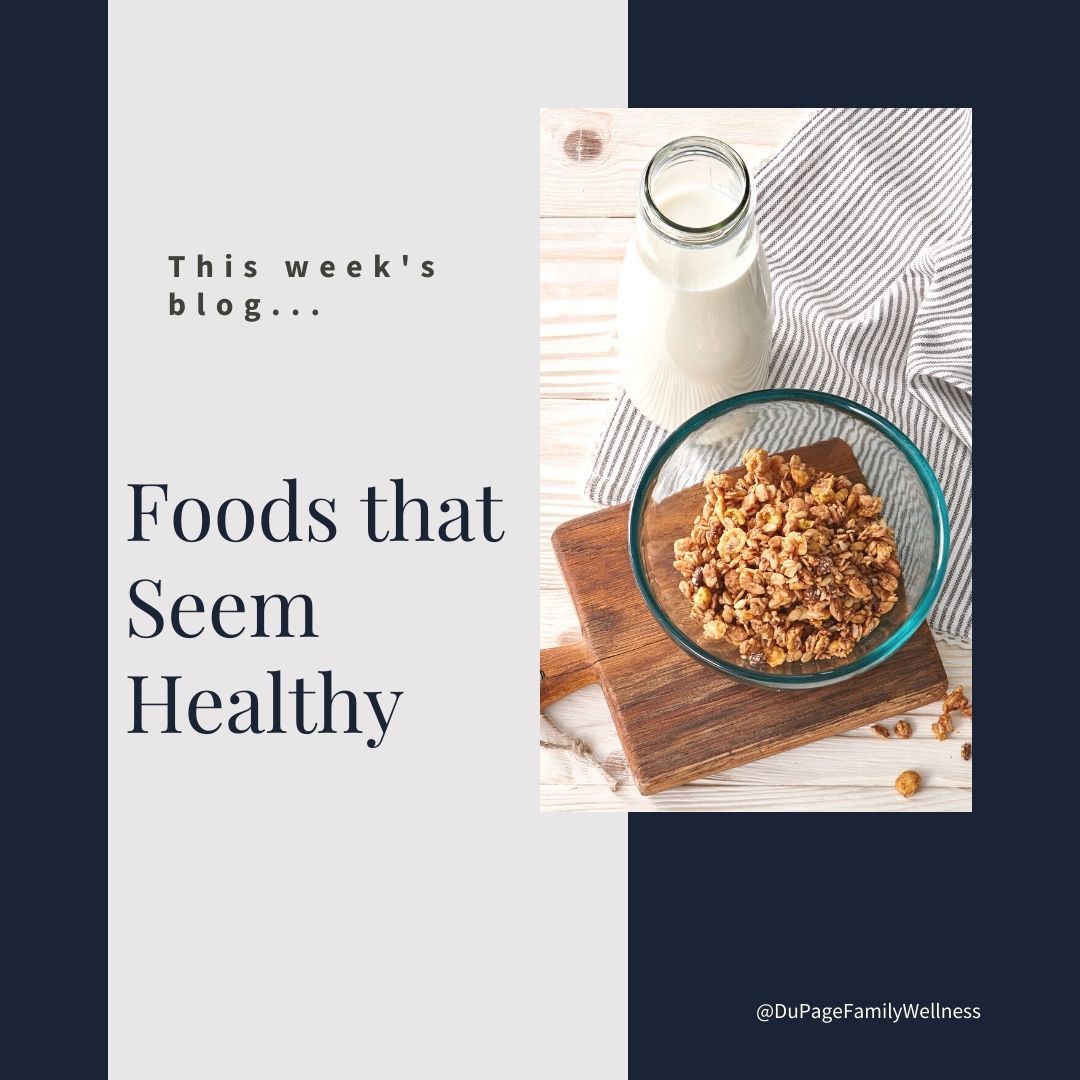 We’ve all heard it, eat fewer calories than you burn and you will lose weight. It sounds so reasonable, but is it really that straightforward? The short answer, is it’s NOT.
We’ve all heard it, eat fewer calories than you burn and you will lose weight. It sounds so reasonable, but is it really that straightforward? The short answer, is it’s NOT.
Trust me, I used to be a calorie counter too. I figured if I ate fewer calories than I burned, I’d lose weight! When it didn’t work, I was confused. My research led me to understand that it is much more complex than the calorie in calorie out myth.
Food is MUCH more than just a source of calories; it is information for our bodies! And our bodies are not simple scales, balancing calories in and calories out. Our bodies have many complex chemical systems that break down the food we eat and process each ingredient in a different way!
Armed with this information, I thought about the foods I used to buy because I thought they were healthy. Keep reading to find out what these foods are along with the reasons that I no longer buy them.
Food Marketing is Tricky
An important point to keep in mind is that food marketers are after their best interest, not yours. The truth is that their main concern is what helps their bottom line.
- Making the food as cheaply as possible.
- Making the food's shelf life as long as possible.
- Making the food addictive so we want to keep eating it and buying it.
Their goals are definitely different than mine. I don’t want the cheapest ingredients in my body. I actually want my food to go bad because if it will last on a shelf forever it must be full of chemicals to keep the bacteria away. And I certainly don’t want to be addicted to my food.
To make matters worse food companies throw in buzzwords like “gluten-free,” “low fat,” “heart healthy,'' and “all natural” to confuse us. This type of marketing makes us believe the foods are good for us even when they’re not.
Boca Burgers and Veggie Burgers
For years I believed that eating red meat was bad for me, so I turned to meat alternatives. The label showed that soy patties have less fat and less cholesterol than a beef burger, and I was sold.
But we don’t have to be afraid of fat! Research has found that cholesterol in the diet does not play a strong role in determining the body’s cholesterol levels. In fact, we need good healthy fats to survive.
We should, however, be cautious with any food product that has a long ingredient list, especially if it contains words you don’t recognize. A good rule of thumb is: "If you wouldn’t want to eat the ingredients plain, then why eat them all combined in a food-like product?”
A good grass-fed burger that comes from a healthy cow that was able to walk around and eat its natural diet while it was alive has only one ingredient: beef! It has important nutrients, and I’d choose that over meat alternatives any day!
Fruit flavored yogurt
I used to eat fruit-flavored yogurt every morning. I loved that it was only 80 calories. But now I look at it and see that it contains “natural and artificial flavors.” I mean, what does that even mean?
I don’t consume much dairy now, but when I do eat yogurt it will be PLAIN FULL FAT yogurt. The less processed the better.
When the milk came out of the cow it had fat in it. Wouldn’t you prefer to keep it that way? The fat is actually HELPFUL in keeping your blood sugar stable for longer periods of time without spiking. And if you want fruit-flavored yogurt, you can add your own real berries!
Read more ...
 Your body may need quite a bit more protein than you are giving it. I’m not talking about adopting a keto or carnivore diet, but you need protein along with complex carbohydrates and healthy fats to thrive.
Your body may need quite a bit more protein than you are giving it. I’m not talking about adopting a keto or carnivore diet, but you need protein along with complex carbohydrates and healthy fats to thrive.

 Over the last few months, I have been doing a deep dive into all things minerals. It is fascinating when you understand what minerals do in the body. It is even more interesting to see how minerals work together in a unique way.
Over the last few months, I have been doing a deep dive into all things minerals. It is fascinating when you understand what minerals do in the body. It is even more interesting to see how minerals work together in a unique way. When you think of eating healthy do you ever think about eating more calories? Most people think that they need to limit calories to eat healthy, but this simply is not the case and can actually cause a lot of harm.
When you think of eating healthy do you ever think about eating more calories? Most people think that they need to limit calories to eat healthy, but this simply is not the case and can actually cause a lot of harm. Most people think of grilling out in the summer, but the fall is a perfect time to heat up the grill. As the weather gets cooler it is more pleasant to cook outside and sit on the patio for a nice meal.
Most people think of grilling out in the summer, but the fall is a perfect time to heat up the grill. As the weather gets cooler it is more pleasant to cook outside and sit on the patio for a nice meal. You may want to change your diet, but don’t feel like you can afford it. The cost of everything has gone up; isn’t healthy food even more expensive? Well, not necessarily.
You may want to change your diet, but don’t feel like you can afford it. The cost of everything has gone up; isn’t healthy food even more expensive? Well, not necessarily. We’ve all heard it, eat fewer calories than you burn and you will lose weight. It sounds so reasonable, but is it really that straightforward? The short answer, is it’s NOT.
We’ve all heard it, eat fewer calories than you burn and you will lose weight. It sounds so reasonable, but is it really that straightforward? The short answer, is it’s NOT. 